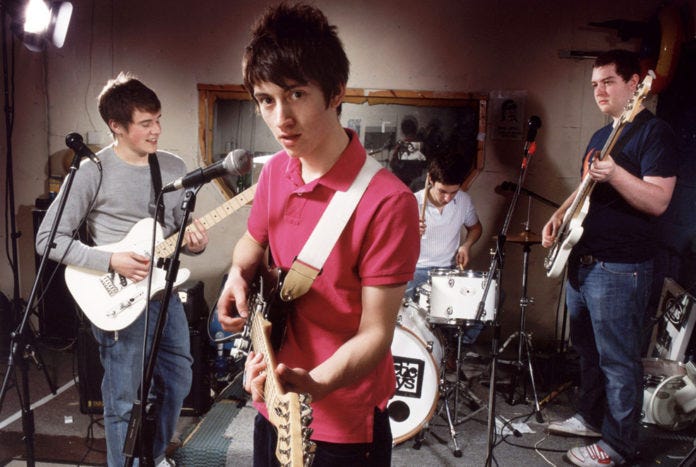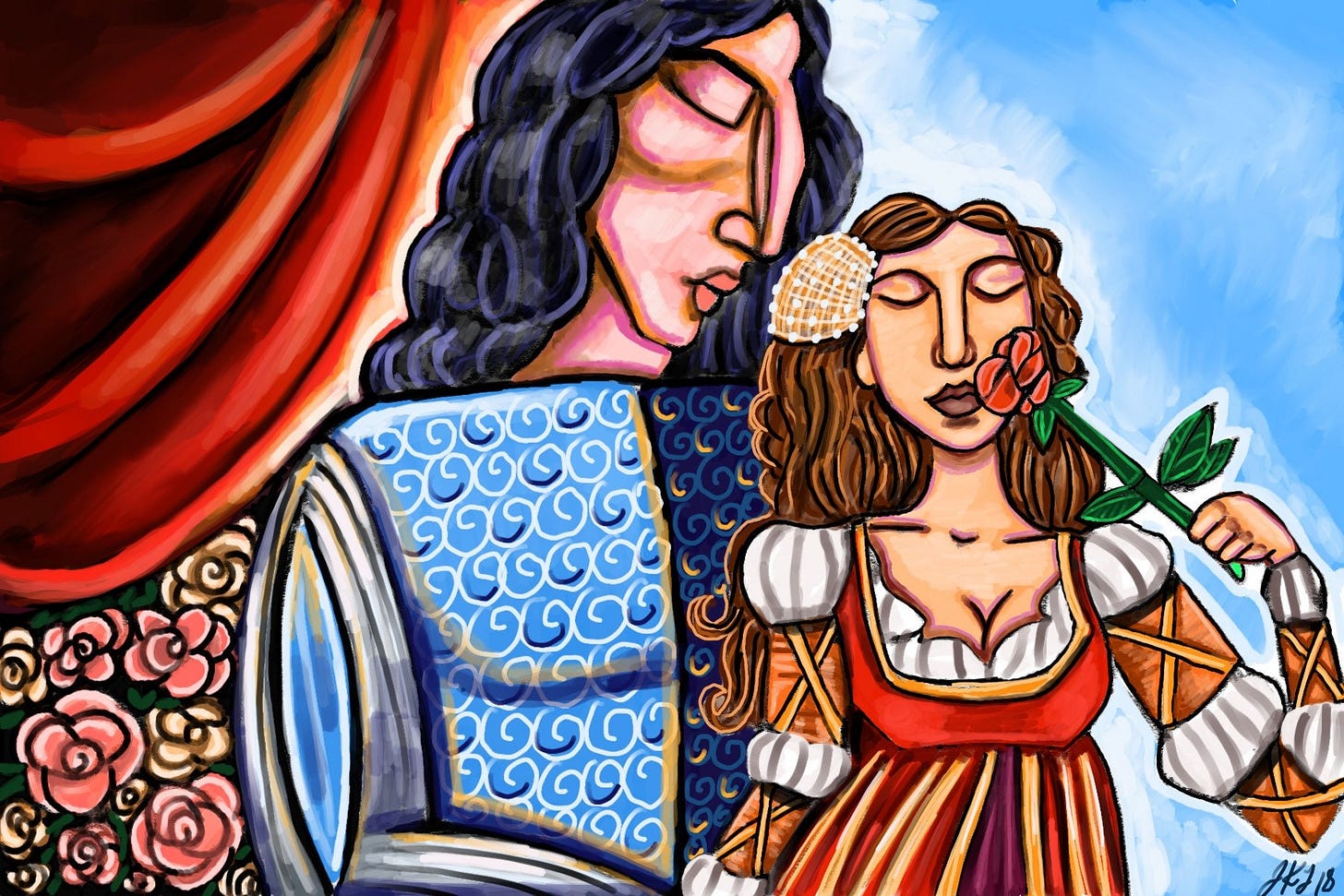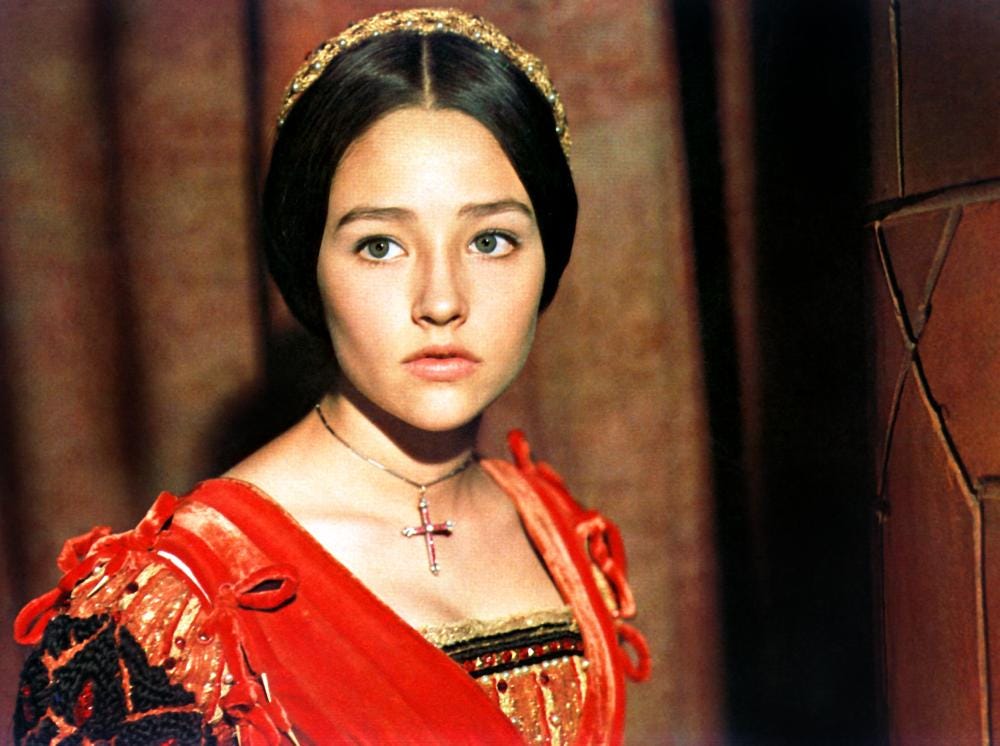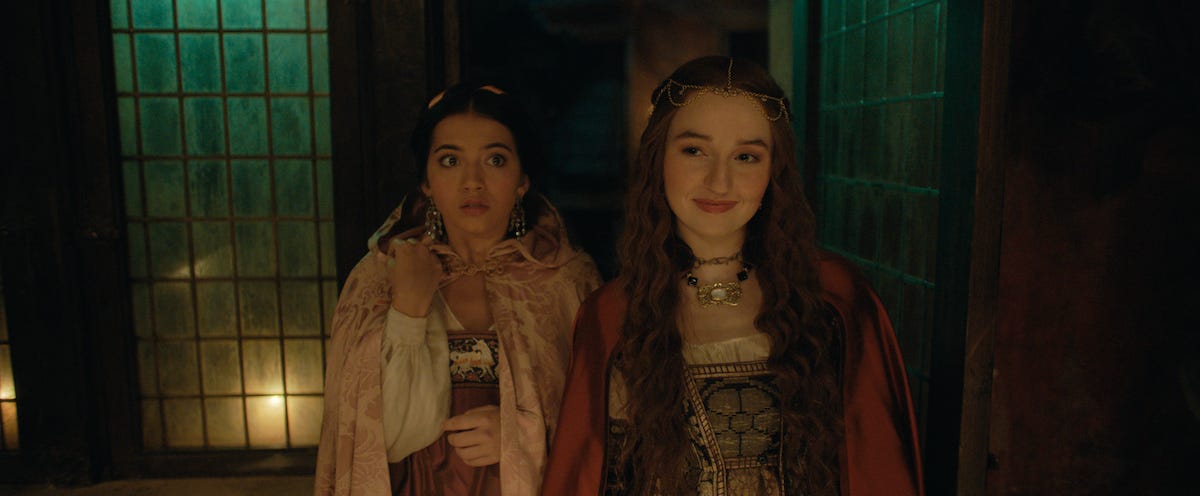Juliet (Olivia Hussey) and Romeo (Leonard Whiting) in the 1968 film directed by Franco Zeffirelli
Prologue - Everybody Knows The Story
In 2005, Arctic Monkeys became the first band to break big via the internet alone. Their incendiary debut single “I Bet You Look Good On The Dance Floor” still amazes twenty years on.
In an early example of online trolling, maybe inevitably given the origin of the band’s fame, there were dullards who, in that era before Insta, before TikTok - hell it was even before Facebook - took to the messageboards (ask yer Mum) to complain that there was no way 19-year-old lyricist Alex Turner could have been aware of the references to Duran Duran and Kraftwerk.
“Your name isn’t Rio, but I don’t care for sand”
“Dancin’ to electro-pop like a robot from 1984”
It was all “Ooh, who helped you write THOSE lyrics young man?”.
Because obviously people in bands are unaware of any music they aren’t old enough to remember from the time it was made.
The song also contains the lyric:
“Oh there ain’t no love, no Montagues or Capulets, just bangin’ tunes and DJ sets”
That’s Montagues and Capulets as in the two warring Houses in Romeo And Juliet. Literally NOBODY complained about this, because EVERYBODY knows about Romeo And Juliet.
Babies are delivered into the world already knowing the story of the star-crossed lovers.
This story is everywhere.
To begin with, it is omnipresent throughout the entire history of moving pictures.
For example, on the day I started writing this article, the missus was watching – and I was half-watching - an episode of Almost Paradise on Freevee.
Not a bad fish-out-of-water cop procedural, it follows an American policeman working in the Phillipines.
The lead is played by Christian Kane - the guy who played Lindsey on the Buffy The Vampire Slayer spinoff series Angel, so that piqued my interest straightaway. Buffy and Angel, now there’s a pair of star-crossed lovers for you. She hunts vampires, he IS a vampire. What could possibly go wrong?
So, the Almost Paradise episode begins with Julia Castro and her boyfriend Ramon Romero discussing the difficulties of their relationship owing to the age-old blood feud between their rival fishing families.
Her family turns up, threatens him and beats him up. We learn that this is only the latest in a series of incidents between the families dating back for decades to a disagreement about the deliberate pollution of the local fishing territory.
Fortunately for Ramon and Julia, the fish feud ends with them both still alive and in love, and with every chance of successfully getting together, unlike (SPOILER ALERT!) in the original play.
Well, I say “original”…
Act I - Pre-Shakespeare versions
It doesn’t begin with the Bard. Shakespeare, like many other writers throughout history - Charles Dickens, Bram Stoker, Alex Turner of Arctic Monkeys to name but three - constantly mixed bits and pieces of legends and also more recent works.
There’s an old Greek tale which goes back to Ovid (6th century) concerning the doomed lovers Pyramus and Thisbe, which is actually included as a play-within-a-play by Shakespeare in A Midsummer Night’s Dream. Who could forget Tom Snout, one of the “rude mechanicals” playing the Wall?
Had there been an internet in Shakespeare’s day there would certainly have been haters hating on him.
They would have been quick to point out that there were even many plays actually CALLED Romeo And Juliet with very similar plots and many of the same characters eventually used by Will in his own take.
Act II - The Play’s The Thing - Shakespeare’s Version (1597)
Verona, Italy.
An age-old vendetta between two powerful families erupts into bloodshed. A group of masked Montagues risk further conflict by gatecrashing a Capulet party.
A lovestruck Romeo Montague falls instantly in love with 13-year-old Juliet Capulet, who is betrothed to another at her father’s bidding.
Juliet’s mother-figure, a sympathetic Nurse, and Romeo’s father-figure Friar Laurence can see where this is all going.
Although the young lovers have not as yet expressed their love physically, as was the fashion at the time, the adults can see that they are undoubtedly fixin’ to fornicate.
The Nurse and the Priest, keen that the couple do not commit the sin of fornication, actually ensure the legitimacy of their union in a marriage ceremony. The couple spend the night together…
Later, Romeo is reluctantly drawn into a street fight which ends with him killing Juliet’s cousin, Tybalt (who to be fair has just killed Romeo’s friend Mercutio) , for which Romeo is banished from Verona for life.
Acting on the Friar’s plan, Juliet fakes her own death so she can be smuggled out of the city to be with Verona. But Romeo does not get the intended message and, thinking Juliet dead, kills himself at her side. Juliet then wakes to find Romeo’s corpse beside her and kills herself.
The grieving families come to their senses and agree that enough is enough. They will end their feud.
The story is told brilliantly, with every potentially implausible plot twist given a proper explanation as events proceed to the inevitable tragic, and genuinely moving, ending.
There are over thirty known big-screen adaptations of Romeo And Juliet, including straight-up versions, parodies, allegory, silent versions, kids’ versions and musicals. Too many to go into here in full, so I’ve restricted myself to the best ones I’ve seen.
Full disclosure - I haven’t seen them all, so if you want to make a case for Barry O’Neill’s 1911 silent version then please be my guest and have at it in the comments section. I’m always ready to be educated.
Act III - Zeffirelli’s Version (1968)
Rewatching the film now is quite a sad experience, with Olivia Hussey (Juliet) having passed away recently.
Back in the 70s and 80s there used to be a feature on Simon Bates’ BBC Radio One show called Our Tune.
Listeners would write in with their choice of “their love song” which went along with their own true-life true love stories. Some were happy but, as the years went by, the feature became darker as the stories became increasingly sad and often tragically devastating.
The music used as the background to this feature was Nino Rota’s gorgeous, portentious main theme for the doomed lovers from Franco Zeffirelli’s 1968 screen version of Romeo And Juliet.
Zeffirelli turns the tale into a proper cinematic experience from the terrific opening fight scene to the final, fatal misunderstanding. The film is boisterous, funny and tender, and the beautiful Veneto scenery is used to full effect.
The performances of Olivia Hussey (15) and Leonard Whiting (16) as the lovestruck teenagers may not be the most technically accomplished, but they are both entirely believable in their roles. Their conviction and intensity go a long way to mask their limited acting experience.
In any case, the two lovers are essentially archetypical idiot teenagers unable to deal with first love, so there isn’t too much depth required other than a depth of passion.
You can argue that the supporting roles in Romeo And Juliet are the ones in R&J that require the better actors, and Zeffirelli casts well. Milo O’Shea does a superb turn as Friar Laurence which may come as a surprise if you only know him from TV sitcoms such as Me Mammy. Robert Stephens is authoritative and compelling as the Prince. John McEnery’s death scene as Mercutio with the Capulets jeering him while he dies, like a group of lads in a pub fight, hits hard.
And then there’s Bruce Robinson as Benvolio, in his first film role, years before he wrote and directed the cult classic about two struggling actors in the late sixties Withnail And I. Paul McGann’s “I” character is based on Robinson himself, and indeed the advances made on that character by Uncle Monty are apparently based on Robinson’s experiences with Zeffirelli on the shoot.
Act IV - Baz Lurhmann’s Version (1996)
You can call me Dad if you like. It’s up to you.
Mark Anthony Lurhmann’s affinity for Shakespeare was clearly the result of nominative determinism. The childhood nickname “Baz” apparently comes from having had a hairstyle reminiscent of puppet TV star Basil Brush.
Best known for Strictly Ballroom(1992) and Moulin Rouge (2001), his version of Romeo And Juliet sits nicely in the middle of those films to complete a “sort of” trilogy (at least for the purposes of selling DVDs and Blu-rays if nothing else).
In an LA setting which would not be out of place in West Side Story, two Mafia families are at war, the mainly white Montagues and the Italian / Hispanic Capulets. It’s a nod to West Side Story, but it’s a nod that signifies “OK, we know you did it this way first, but this is the real deal.”
The opening confrontation is at a petrol station. There is a brash, urban 70s style to the aesthetic, mining the same vein as Tarantino.
The performances from Leonardo diCaprio (Romeo) and Clare Danes (Juliet) are OK, despite a lack of any real on-screen rapport. Both have done fine work elsewhere so it’s hard to avoid the conclusion that there is something about these roles that does not bring out the best in actors.
Again it is the supporting cast who catch the eye. John Leguizamo as Tybalt and Paul Sorvino as Fulgencio Capulet (see above) are excellent as always.
Harrold Perrineau as a gay Mercutio is brilliant, but the star turn for me is Miriam Margoyles, an absolute revelation as the Nurse.
The contemporary pop music works only intermittently, and the familiarity of the tunes outside the film’s wqunorld can be jarring. I would question for example, why Quindon Tarver’s cover of Prince’s When Doves Cry was shoehorned-in. That said, his take on Everybody’s Free at the marriage ceremony is perfect, and perfectly placed.
Baz Lurhmann set out to make an accessible version of Romeo And Juliet while sticking to Shakespeare’s original dialogue, and the film succeeds magnificently as a gateway drug to the classics for teenagers, while losing very little of the power of the text.
Act V - The Inevitable Rom-Com Version
“I can’t wait to be old like you are, Rosaline.”
At the start of the original play, Romeo is in love with Juliet’s cousin Rosaline, but upon seeing Juliet from afar, he instantly transfers his affections. Poor Rosaline doesn’t get so much as an appearance, let alone any lines.
Rebecca Serle’s book When You Were Mine, and the film, directed by Karen Maine, marvellously redresses this balance.
Scripted and played like the Rom-Com it is. Or Romeo-Comeo, if you must. This is a wonderful take on the tale which rings more true than any other I’ve seen or read.
The story is the same as the play, but with Rosaline as the central character.
Rosaline has a suitor, Dario, who she obviously likes, but still carries a torch for Romeo. Smarter than he seems, he plays his hand to perfection, never pushing it, content to wait for Rosaline.
One of the really interesting strands to this movie is watching Rosaline, an intelligent girl, working through her Romeo fixation.
Once she has done so, incidentally leaving her free to give it a go with Dario, Rosaline works to make sure Juliet and Romeo actually do get together and live happily ever after.
Rosaline’s reaction to their plan for a fake suicide pact is “There’s like 50 different things that could go wrong!” and when she says it like that, it does become bleeding obvious. Juliet just needed a mate to tell her some home truths.
Without spoiling the ending, I found it very satisfying in showing the answer to the question “What if Romeo and Juliet had survived?”
There are modern tunes on the soundtrack. There are modern-style gags. All this adds to the story rather than getting in the way.
A charming movie which unfortunately can only be seen on Pay Per View on streaming services - I couldn’t find any hard copy release. This is a trend that I’mnot in favour of as it means The Man can charge you more and more for a movie without you ever actually owning it. Very short-sighted in terms of getting more people to see the film.
OK, rant over. It’s currently available to rent on Amazon for £3.49 in the UK and if you twisted my arm I would have to admit it’s worth every penny.
Epilogue
So which is my favourite version?
I love all three of the films I’ve included here and I wouldn’t like to pick just one. They would make a cracking triple-bill for a wet Sunday. But I guess if you want the closest to a definitive version, go with Zeffirelli, probably.
There are so many other versions, too.
Bollywood versions. West Side Story. An animated version called Gnomeo And Juliet.
And for all I know, a gay version called Romeo And Julian.
Enough to fill an entire book. Maybe I’ll get round to writing it some day.
I’ve put some of the music from the various adaptations on a Spotify playlist, along with a few R&J inspired songs. Enjoy!
And let me know what you think in the comments.










